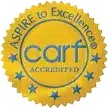Beachside Teen Treatment Center
Does My Teen Have ADHD? - Parent Test
Begin our free ADHD test for parents to gain insight into your teen’s focus, behavior, and attention patterns and discover when expert guidance may be needed.


If you’re a parent worried that your teen may be struggling with attention issues, hyperactivity, or impulsive behavior, you’re not alone.
Many parents notice changes in their child’s ability to focus, stay organized, or control emotions during adolescence and wonder if it’s typical teenage behavior or a sign of something more. Attention-Deficit/Hyperactivity Disorder (ADHD) is one of the most commonly diagnosed mental health conditions in teens, yet it is often misunderstood.
Knowing the difference between normal teenage struggles and ADHD symptoms can help you decide when it’s time to seek professional support.
ADHD Test For Teens
Understanding ADHD in Teens
ADHD is a neurodevelopmental disorder that impacts a teen’s ability to manage focus, attention, energy levels, and impulse control. While symptoms often appear in childhood, they frequently become more noticeable and disruptive during adolescence. High school years bring increased academic demands, extracurricular pressures, and greater independence—all of which can magnify ADHD symptoms.
ADHD presents in different forms, typically categorized as predominantly inattentive type, predominantly hyperactive-impulsive type, or combined type.
A teen who struggles with inattention may appear distracted, forgetful, or unmotivated, while a teen with hyperactivity and impulsivity may seem restless, disruptive, or unable to slow down. Many teens experience a combination of both.
It’s important to recognize that ADHD is not a sign of laziness, poor parenting, or a lack of intelligence.
Teens with ADHD are often creative, energetic, and capable of great achievements—but without proper support, they may feel misunderstood, frustrated, and overwhelmed.
Signs and Symptoms of ADHD in Teens
In teens, ADHD may also show up as emotional struggles, including irritability, frustration, and sensitivity to criticism. Social challenges are also common—teens with ADHD may have conflicts with peers, misunderstand social cues, or feel isolated because of impulsive or disruptive behaviors.
When these symptoms interfere with school performance, friendships, or home life, it’s time to consider a professional evaluation.
ADHD symptoms can look different from one teen to another, but common signs include:
- Inattention: Trouble focusing on tasks, easily distracted, difficulty completing schoolwork, forgetfulness, losing personal items, or seeming “spaced out.”
- Hyperactivity: Constant movement, restlessness, difficulty sitting still, excessive talking, or appearing driven by an “internal motor.”
- Impulsivity: Acting without thinking, interrupting others, blurting out answers, risky behaviors, or difficulty waiting for turns.
Tour Our Teen Treatment Programs
Why ADHD Symptoms Increase During Adolescence
Adolescence is a stage of rapid growth, both physically and mentally.
The teenage brain is still developing, especially in the prefrontal cortex, which governs executive functioning skills like planning, organization, and self-control.
Because of this, teens naturally struggle more with decision-making and emotional regulation than adults. For a teen with ADHD, these challenges are amplified.
The transition to middle and high school brings greater academic expectations, longer assignments, multiple classes to manage, and the need for self-discipline. At the same time, teens are navigating new social dynamics, peer pressure, and the desire for independence.
The combination of developmental changes and life pressures often makes ADHD symptoms more obvious and more disruptive during this stage of life.
Without treatment, teens with ADHD may face higher risks of academic failure, social isolation, substance use, and low self-esteem. However, with the right support, teens can learn to manage symptoms and build skills that help them thrive.
Causes of ADHD in Teens
Researchers believe ADHD arises from a combination of genetic, neurological, and environmental factors. While there is no single cause, some contributing factors include:
- Genetics: ADHD often runs in families, suggesting a strong hereditary link.
- Brain differences: Imaging studies show variations in brain structure and function, particularly in areas that control attention, impulse regulation, and executive functioning.
- Prenatal factors: Exposure to tobacco, alcohol, drugs, or high stress during pregnancy may increase risk.
- Early life experiences: Premature birth, low birth weight, or early exposure to toxins may play a role.
It’s important to note that ADHD is not caused by poor parenting, too much screen time, or a lack of discipline.
These factors may worsen symptoms but are not the root cause. Understanding ADHD as a brain-based condition helps reduce stigma and encourages parents to seek effective treatment options.
Treatment in Los Angeles for ADHD & Mental Health Disorders
At Beachside Teen Treatment Center, we specialize in helping adolescents with ADHD and co-occurring mental health concerns find balance, structure, and hope.
Our ADHD treatment approach may include:
- Comprehensive evaluation and diagnosis to ensure accuracy.
- Medication management when appropriate, with careful monitoring.
- Evidence-based therapies such as Cognitive Behavioral Therapy (CBT), which helps teens build organizational skills, manage impulsivity, and develop healthier coping strategies.
- Group therapy to improve social skills, foster peer connections, and reduce feelings of isolation.
- Family therapy to strengthen communication, provide education, and create a supportive home environment.
- Holistic therapies such as mindfulness, art, and recreational activities to help teens regulate emotions and channel energy in positive ways.
Our structured environment provides the consistency teens need while allowing them to explore their creativity, independence, and resilience. By addressing both ADHD and any co-occurring issues such as anxiety, depression, or substance use, we empower teens to succeed academically, socially, and emotionally.
Los Angeles Teen Treatment Programs
At Beachside Teen, we understand that every adolescent has unique needs when it comes to their mental health journey.
That’s why we offer a range of levels of care, ensuring each teen receives the right amount of structure, support, and therapeutic guidance at the stage they are in.
Parents can feel confident knowing that their child will be matched with the level of care that best supports long-term healing and growth.
More: What Parents Can Expect
Residential Treatment
For teens who need a highly structured, immersive environment, residential treatment provides 24/7 care in a safe and supportive setting.
Here, adolescents step away from daily distractions and stressors, focusing fully on their healing with constant access to therapists, counselors, and clinical staff.
This level of care is especially helpful for teens with severe ADHD symptoms, co-occurring disorders, or those who have not responded to outpatient support alone.
Partial Hospitalization Program (PHP)
The Partial Hospitalization Program offers a step down from residential care while still providing intensive daily support. Teens spend most of their day in treatment, attending therapy sessions, educational programming, and skill-building groups—before returning home or to supportive housing in the evenings.
PHP is ideal for teens who need a high level of care but benefit from beginning to practice independence outside of treatment hours.
Intensive Outpatient Program (IOP)
The Intensive Outpatient Program allows teens to participate in structured therapy several days a week while continuing to live at home and attend school part-time.
IOP provides strong clinical support while allowing more flexibility, making it a good fit for adolescents who are ready to transition back into their daily lives but still need consistent therapeutic guidance and accountability.
Therapeutic Education Program
At Beachside, academics and emotional growth go hand in hand. Our Therapeutic Education Program ensures that teens continue their schooling in a supportive environment tailored to their unique learning needs.
With smaller class sizes and individualized attention, this program helps students regain confidence in their academic abilities while receiving ongoing therapeutic care.
Aftercare
Healing doesn’t end once a teen completes a formal program. Our Aftercare services provide ongoing support to help adolescents maintain progress, manage challenges, and avoid relapse. Aftercare may include outpatient therapy, support groups, family counseling, or alumni programs that keep teens connected to their recovery community. This level of care ensures long-term success and helps teens apply what they’ve learned in real-world situations.
More On ADHD
Begin Adolescent ADHD Treatment in Los Angeles Today
If your teen is showing signs of ADHD, trust your instincts. Early recognition and professional support can make all the difference in your child’s future.
You don’t have to navigate this alone. Contact us today to learn more about our ADHD and adolescent mental health treatment programs and find out how we can help your teen regain focus, build confidence, and thrive.
Mark Paladini
Director of Education
Last Updated on September 10, 2025
Find Help For Your Family
At Beachside, our trusted programming meets the highest standards for quality adolescent healthcare.
Table of Contents
Meet Our Trusted, Compassionate Care Team
When left untreated, adolescent behavioral health issues can lead to lifelong struggles with mental health and addiction. We’re here to help your child discover healthy coping mechanisms to deal with stress and mental health symptoms. Our team is a diverse group of professionals who are here to provide for your child’s needs throughout their treatment program.










